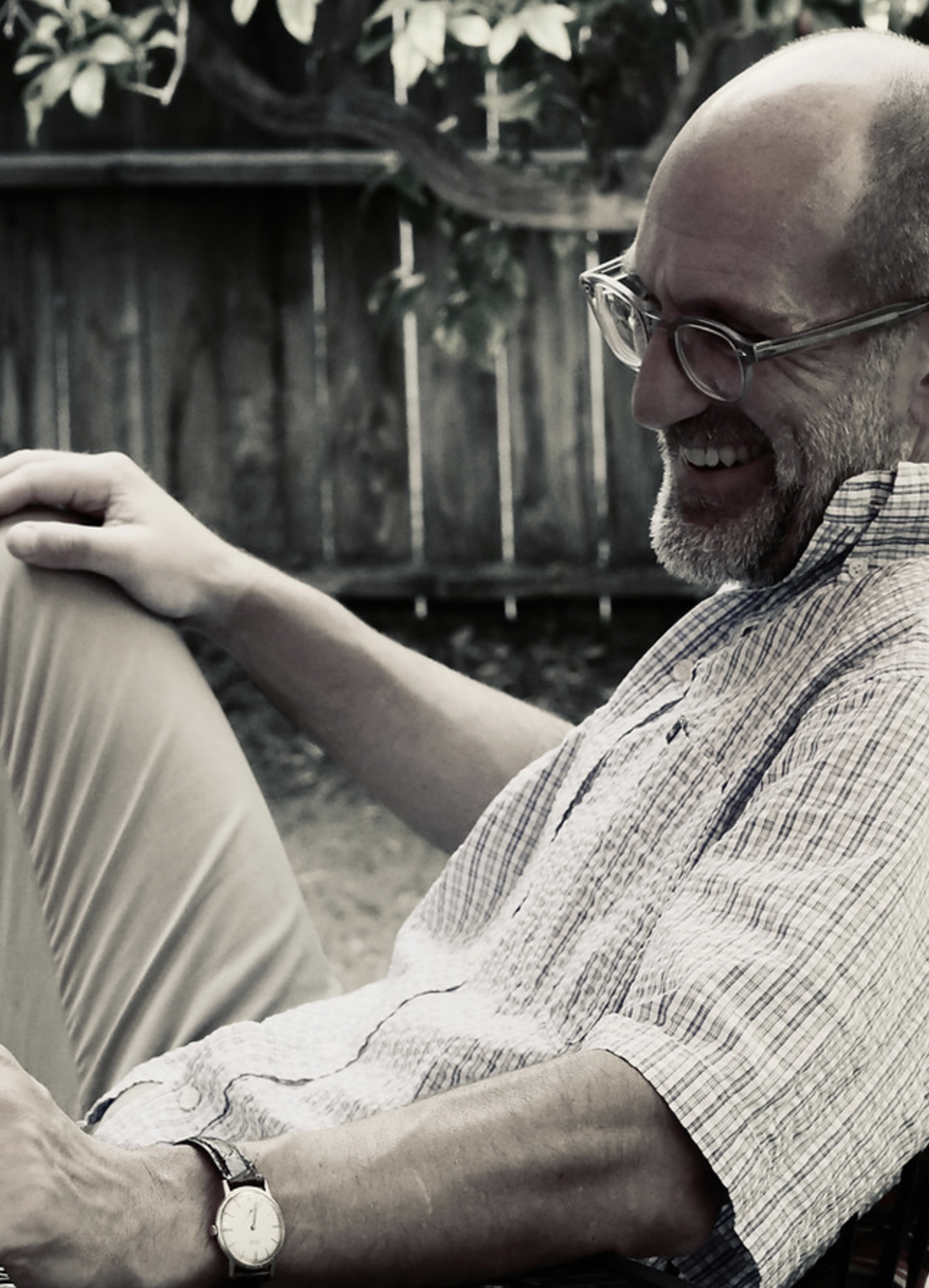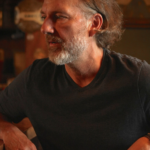Michael Farris Smith stays busy. In little more than a decade he’s published seven novels. His eighth, Lay Down Your Armor, appears in 2025. These have produced a drumbeat of critical praise, starred reviews, and Best of the Year commendations, and two were made into feature films released in 2023: Desperation Road and The Fighter (retitled Rumble Through the Dark). Michael wrote both screenplays. Meantime, around his hometown of Oxford, Mississippi, he fronts The Smokes, whose EP Lostville dropped in 2024. Michael wrote all the songs.
He’s now busy with something he hasn’t tried before: directing. Chasing Rabbits, a short film based on his short story of that title, will premiere early in 2025 at the Oxford Film Festival. The film is produced by Anthony Thaxton and Robert St. John through the Institute for Southern Storytelling. The cast includes McGhee Monteith (Walk the Line), stage actor Stephen Garrett (The Mouse Trap, Jesus Christ Superstar), and blues musician Davis Coen (Free State of Jones).
When I met Michael in Oxford in early December, he’d finished shooting the movie and was heading down to Clinton the next week to start editing. We sat down over coffee at Square Books, in view of the gleaming, Lafayette County courthouse out the big windows upstairs. I was curious to hear about his Mississippi boyhood. The internet told me we were about the same age and might well have played high school baseball against each other. In the event, we could do better than that: he was pretty sure he’d gone to second grade in my hometown of Yazoo City when his father, a Baptist preacher, spent a year at a church I remembered to be a softball powerhouse.
From there we proceeded to spend the better part of an hour talking about writing fiction and playing music and making films in general and Chasing Rabbits in particular. Then Michael had to push off. To run pick up a cake. His house was about to fill up for his daughter’s birthday party. I followed up by email with some questions. Which he did not sit on.
How exactly did you come to direct Chasing Rabbits?
MFS: I was invited by Anthony Thaxton, who directs the Institute for Southern Storytelling, to come and do an interview for PBS. Anthony had produced a couple of documentaries with the Institute, including the recent and very well-done Eudora Welty documentary, and when the interview was over he mentioned that they wanted to do something with more of a narrative. In the interview we talked about my role on-set with the film adaptations of my novels, and he asked me if I had a short story that I thought would work as a short film. My answer was, “Of course.” Which I would have said even if I didn’t. But then he asked me if I wanted to direct, which I did, and we shook hands and went from there. About four months later, we were done shooting. That’s warp speed in the film world for any project.
Did writing the screenplays for Desperation Road and Rumble Through the Dark whet your appetite for directing? Did it teach you anything that has proven helpful?
MFS: It absolutely got me interested. I was fortunate on both films that the directors wanted me there on set, so during those shoots I was talking to actors, watching and listening to what was going on from a chair right next to the director chair, watching the cinematographer and how he was going about things with camera and lighting, and pretty much everything else. I guess in some ways it was like film school on the fly. And I’ve always been a visual learner so a lot of what was going on really sunk in.
What it really taught me was that you can create something interesting or lovely or risky out of every moment. Just like in a novel. It taught me that you have to be able to adapt and shift on the fly because what you have written in the script as far as location and what things are supposed to “look like” isn’t always available. As well as about a thousand other problems that might pop up. That’s also part of the challenge that, to me, makes the act of doing it and doing it successfully so rewarding. You have to be ready for anything.
What made you choose “Chasing Rabbits” for this project?
MFS: That story was written well before any of the movie stuff came along, probably by ten years. But about six years ago I was asked by the Tennessee Williams Festival to adapt a short story into a one-act play to be performed as part of the festival, and I chose “Chasing Rabbits.” It’s only three characters, a contained setting, which also made it ideal for adapting to film. That was my first attempt at adapting anything, and I really enjoyed the process of it. And then when it was performed, it was so interesting to watch the actors and see what they were doing and hear the dialogue come to life. And to see the audience reaction as well. Those are things you just don’t get very often as a novelist. And quite honestly, by the time you get it, you are on book tour or doing events and the novel has been finished for at least a year. I think making the story into the play probably kickstarted my desire to get into writing a script and gave me some instant, or more instant, gratification from my work that I wasn’t accustomed to.
Going into this project, were there aspects of directing that concerned you? Or even intimidated you? And how did that pan out?
MFS: I have a habit of raising my hand and saying I can do something when I’m not really sure if I can do it. So there’s always that as far as a concern, which I suppose is part of the fun or I wouldn’t keep doing it.
I thought going in, and I was right, there are a lot of things that translate from writing fiction to directing a film. As the writer, I’m the camera. All of the time. And when writing a novel, you create scene over and over. You dictate the camera angle for the reader. You decide what’s in the room or what time of day it is and every little detail that helps to create the vivid and continuous dream for the reader. Being a director is very similar. You are creating the visuals, the movement, the mood, the atmosphere. It’s a mindset that I have grown accustomed to over the span of writing eight novels. I like the way it feels as a writer and I found out that I also like the way it feels as a director. The difference is the collaborative nature of filmmaking and that’s why it’s important to put talented and trustful people around you. Which I was fortunate to do, and that alleviates a lot of the concern.
Were there things about directing that maybe you underestimated the difficulty of?
MFS: Not so much with “Chasing Rabbits.” It’s a tight script in a contained and controlled space. But as far as the film adaptations, I really underestimated the importance of the economy of time. The clock is always ticking on a film set. You have a set amount of time to get everything done and if you don’t, then that’s just too bad. I wasn’t expecting that type of schedule.
What’s been your favorite stage or aspect of this project: scripting, shooting, editing, music…?
MFS: That’s a tough question. It’s almost like building a house. One thing has to happen before the next thing can happen, and each stage has its own challenges and rewards and obstacles. I always love the moment the camera comes on for the first time and you see your characters on the monitor on the first day of shooting. It’s so exciting. And I will say that in the creation of it all when you know you have the script right and it’s time to start trying to actually do the thing, that’s an exciting moment and propulsive feeling that is hard to ignore.
Are there particular books or stories you’ve read and thought, Man, I’d like to try making a movie of that?
MFS: The Ballad of the Sad Café by Carson McCullers. It’s one of my favorite books. It’s so dark, so absurd, such a great setting, such heartbreaking, unique characters with such a heartbreaking story. I think it would make a powerful and emotional film. If done right.
After growing up in Mississippi, you spent some time as a young man living in Europe, then returned to Mississippi, where you’ve lived ever since. Did living abroad change the way you saw or felt about your home state? And how do you think that experience has affected the way you write about Mississippi and its people?
MFS: It absolutely changed the way I thought about Mississippi and the things I’d heard and been taught my entire life. It changed the idea of home. It changed the way I thought about certain people I knew. It was the unexpected opportunity to step back away from basically everything I had experienced and learned, and view it from a distance. And quite honestly I think that would be a good exercise for anyone. Some more than others.
I do think it affected the way I ended up writing about Mississippi and its people. I can’t say how specifically, but it would be naïve to think that I am the same writer that I would have been if I had never left and had the experience. When your world view changes, when your ideas and interpretations of home change, that is absolutely going to affect your art. I think, perhaps, it has helped me write about Mississippi with more honesty.
Your work is sometimes labeled “grit lit,” but you’ve also written Nick, a prequel of sorts to The Great Gatsby, and The Hands of Strangers, about a kidnapping from Paris’s Musée D’Orsay. Decidedly not grit lit. Is this versatility, or expansiveness, or whatever we might call it, something you think about?
MFS: No. Not really. I’m driven by whatever idea moves me on an emotional level and nothing else. One of the things I have tried to practice in my writing life is not to think too much. For me, it only seizes you up and creates doubt. I was moved by the notions of Nick Carraway, what he might have experienced to bring him to be the man that told the story of Gatsby the way he told it, and I share in the expatriate feeling, so I just dove in. Same with The Hands of Strangers. I saw a flyer for a missing child in a metro station in Paris and it just gutted me, imagining the person who tacked the flyer on the bulletin board and what they might be going through. So I just dove in. I think if I ever become too calculating, I won’t be the same writer. And that would be a mistake.


